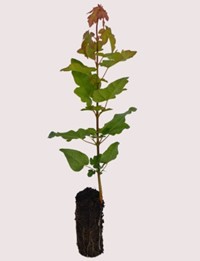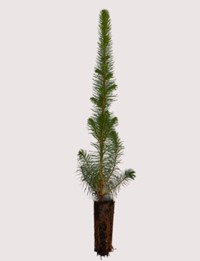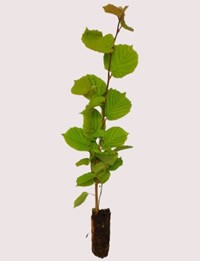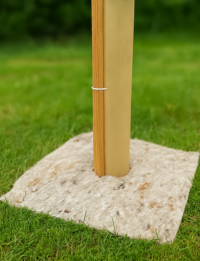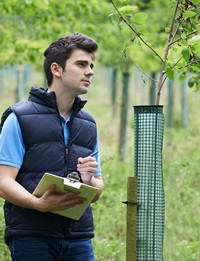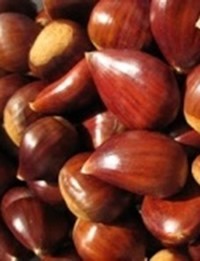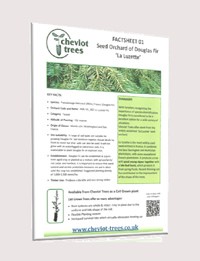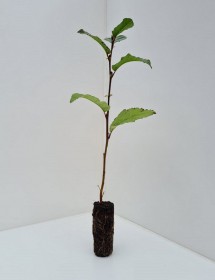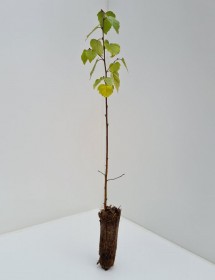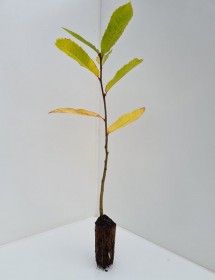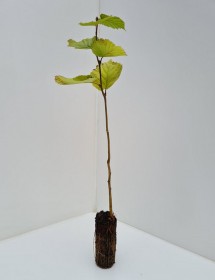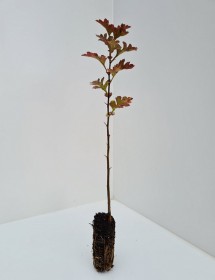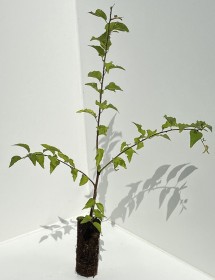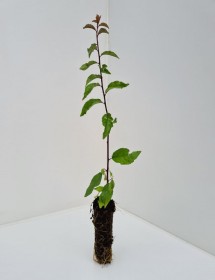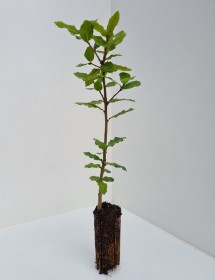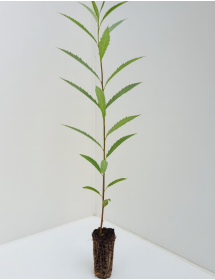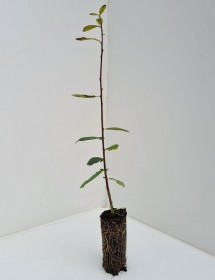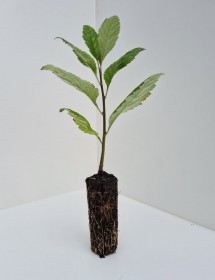
Broadleaves
At Cheviot Trees in the Scottish Borders, we grow a wide range of broadleaves, to suit all planting objectives, from commercial timber production, to small woodland and conservation planting, hedging and shelterbelts.
Grown from both productive and local provenance seed sources we have plants to meet all requirements.
-
Acer campestre - Field Maple
£1.52from £0.91Acer campestre - Field maple is a versatile and resilient fast growing small to medium sized tree that is also suitable for hedgerow planting.
It is a colourful species; the attractive five lobed leaves are flushed red in Spring, turning green and then yellow / gold in the Autumn. Deciduous. Native to the UK
Our cell grown Field Maple plants are often used for hedge planting either on their own or mixed with other species such as Hawthorn, Blackthorn, Hazel etc. Usually at a planting density of 6 plants per metre.
-
Acer platanoides - Norway Maple
£1.98from £0.88Acer platanoides - Norway Maple is a beautiful fast growing tree of large stature which is best suited to parkland or settings where its superb autumn colour can be fully appreciated.
Deciduous. Native to Central / Eastern but widely adapted to the UK. Norway Maple has a typical maple shaped leave which turns bright yellow in the autumn.
-
Acer pseudoplatanus - Sycamore
£1.82from £0.81Acer pseudoplatanus - Sycamore. The marmite of forestry that needs little or no introduction. Undemanding, tolerant, and productive.
Deciduous. A native to central and southern Europe but is considered by some to be an honorary native to the UK. Simple, large green leaves and interesting grey, flaky bark.
We produce this species from multiple seed sources including an Improved seed source. The breeding work to produce the Improved seed was carried out by the Future Trees Trust.
-
Alnus cordata - Italian Alder
£1.70from £0.74Alnus cordata - Italian Alder is a fast growing, medium sized tree which grows in most soils except heavy clay. Tough and hardy with nitrogen fixing qualities. Often used on reclamation or hostile sites.
Bright green glistening foliage preceded by yellow catkins that appear in late winter. Ideal for forming a windbreak or for companion planting with species such as Douglas Fir and Sitka Spruce.
-
Alnus glutinosa - Common Alder
£1.52from £0.67Alnus glutinosa - Common Alder, is a medium to large sized tree liking a natural habit of damp ground near rivers and lochs, but it is equally found in mixed woodlands on drier ground.
-
Alnus rubra - Red Alder
£1.70from £0.74Alnus rubra - Red Alder shares many of the features of our native Common Alder and is ideal for forming a windbreak or for companion planting with species such as Douglas Fir and Sitka Spruce.
-
Betula pendula - Silver Birch
£1.52from £0.67Betula pendula - Silver Birch is one of the UK’s most well-known and hardiest native trees which offer so much interest due to its graceful habit and papery/peeling white bark with brown contrast.
Deciduous. A true pioneer species which rapidly colonises open areas and supports over 300 species of insect. Silver Birch is one of the most productive broadleaves species in Scandinavian countries and a multifunctional species for the UK. Excellent planted as a mixture with other species, superb as a windbreak and provides excellent quality firewood!
We produce this species from multiple seed sources including an Improved seed source. The breeding work to produce the Improved seed was carried out by the Future Trees Trust.
-
Betula pubescens - Downy Birch
£1.52from £0.67Betula pubescens - Downy Birch is probably one of the toughest native species. Its range extends into the artic, more northerly than any other broadleaved species!
Deciduous. It is similar in appearance to Silver Birch but has a more upright habit and a darker bark.
-
Carpinus betulus - Hornbeam
£1.82from £0.81Carpinus betulus - Hornbeam is an excellent versatile species which can either be used for forestry purposes or for hedging. If grown for hedging the leaves will stay on throughout most of the winter.
-
Castanea sativa - Sweet Chestnut
£1.98from £0.88Castanea sativa - Sweet Chestnut is a good example of a multi functional species. Excellent as a parkland tree, great for coppicing, and the chestnuts provide a tasty treat for red squirrels!
Native to Southern Europe but thought to be introduced by the Romans, Sweet Chestnut is found throughout the UK and is commonly associated with Southern England. Deciduous with long, narrow glossy leaves.
-
Corylus avellana - Hazel
£1.82from £1.09Corylus avellana - Hazel is a small shrubby tree which is often found in mixed native woodlands and hedgerows.
It is well known for its long yellow catkins which appear in the Spring and then produces hazelnuts in the summer. Native to the UK.
Our cell grown Hazel plants are often used for hedge planting either on their own or mixed with other species such as Hawthorn, Blackthorn, Dog Rose etc. at a planting density of 6 plants per metre.
-
Crataegus monogyna - Hawthorn
£1.60from £0.70Crataegus monogyna - Hawthorn is the backbone of most British hedgerows and is one of the first species to produce new leaves in the Spring. If left untrimmed it will grow into a small tree with a very dense crown.
A very showy native species with fragrant, creamy white flowers in the Spring followed by green haws (berries) turning red in autumn.
Spiny, dense deciduous foliage which provides an excellent habitat for birds and insects.
Our cell grown Hawthorn plants are often used for hedge planting either on their own or mixed with other species such as Crab Apple, Blackthorn, Dog Rose etc. at a planting density of 6 plants per metre.
-
Fagus sylvatica - Green Beech
£1.82from £0.81Fagus sylvatica - Green Beech is one of the most widely planted broadleaved trees in Europe. A long lived species that is commonly used in the UK as a component in a mixed woodland, for hedging or for parkland planting due its very broad crown.
Smooth, silver grey bark. Dark green leaves turning yellow then copperin autumn. The leaves are retained on the plant during the winter if the plant is maintained as a hedge. If you are comparing Beech or Hornbeam for hedging and you have damp soil and or you are in a cold exposed area then we would suggest using Hornbeam.
-
Juglans regia - English Walnut
£3.64from £1.73Juglans regia - English Walnut is a large fast growing species. A well known tree which was first introduced by the Romans who valued its nuts. Native from South-East Europe to South-west China.
Widely planted throughout the UK an it makes a fantastic and well shaped specimen for planting in parkland area, avenues, riverbanks and as a hedgerow tree.
The timber is equally as valuable as the nuts and can be used for furniture manufacture and veneer.
The foliage is shiny, pinnate with individual oval pointed leaflets which turn yellow in autumn.
Flowers appear in early Summer in the form of long catkins and in the Autumn the flowers turn to brownish green fruits that are around the size of a plum. The brown nut is held inside the husk.
We also produce Juglans nigra - Black Walnut.
-
Malus sylvestris - Crab Apple
£1.62from £0.85Malus sylvestris - Crab Apple is a good multi purpose native species. Good as part of a mixed hedge or woodland.
Deciduous. Glossy, oval leaves which has rounded teeth and sweetly scented blossom in the Spring which is pollinated by insects and bees. The pinky white blossom them develops into small, yellow-green apple like fruits.
Crab apple is an important food source for wildlife. The leaves are enjoyed by caterpillars of many moths, the flowers are an important early pollen source and the long lasting fruits are eaten by birds during the winter months.
-
Platanus acerfolia - London Plane
£3.47from £1.65Platanus acerfolia - London Plane is extensively planted in Southern England as a street trees due to its tolerance for air pollution but it is considered to also be a useful forest tree for the UK as a result of climate warming.
A vigorous deciduous tree with distinctive flaky brown and grey bark.
London Plane has large bright green lobed leaves with interesting clusters of round fruits.
The timber is strong and widely valued for joinery / cabinetry.
-
Populus Hybrid - Hybrid Poplar
£2.30from £1.03Populus Hybrid - Hybrid Poplar is a very versatile and vigorous clone which has been produced from natural plant breeding.
This clone will grow into a large tree with a stout stem. Ideal for wood fuel production, creating windbreaks and screening.
Deciduous with glossy green heart shaped leaves which turn brilliant yellow in autumn.
-
Populus nigra - Black Poplar
£2.40from £1.35Populus nigra - Black Poplar is probably the rarest tree species in our range! Black Poplar is native to the UK and was once a common sight throughout the country but there are very few in existence.
Deciduous. Shiny green leaves which are heart shaped. Black Poplar is dioecious meaning male and female flowers are found on separate trees. The flowers are in the form of catkins which are red on male trees and yellow-green on females.
-
Populus tremula - UK Aspen
£1.82from £0.81Populus tremula - Aspen is a beautiful large fast growing tree which is native to the UK and the cooler regions of the northern hemisphere. It is characterised by its trembling and shimmering foliage.
Deciduous. Aspen is a very useful tree species which helps to stabilise soils, mitigate pollution plus it has a high ecological value for numerous insects and fungi. Aspen is a valuable and well regarded timber crop in Scandinavia for firewood, plywood manufacture and paper production.
We grow aspen from two different sources; a UK seed source and also a specific Scottish clonal collection. The latter option is more expensive than the generic UK source due to significantly higher propagation costs but it enables us to offer a reliable supply of plants from a Scottish origin.
-
Prunus avium - Wild Cherry
£1.93from £0.93Prunus avium - Wild Cherry is an attractive species not only aesthetically but also in commercial terms. The timber from Wild Cherry is highly valued in Europe with the top quality pieces destined for the veneer industry.
A large deciduous tree that requires plenty of space. Expect all year round interest with Wild Cherry. It has deep reddish brown shiny bark and the new bright green toothed leaves appear simultaneously with the long lasting clusters of white flowers. Once pollinated the flowers develop into globular shiny, deep red cherries. The leaves turn gold through to red in the Autumn to provide a spectacular show.
We produce this species from multiple seed sources including an Improved seed source. The breeding work to produce the Improved seed was carried out by the Future Trees Trust.
-
Prunus cerasifera - Cherry Plum
£1.70from £0.74Prunus cerasifera - Cherry Plum is a fast growing, dense hedging plant which is an excellent choice for providing shelter.
Masses of pure white flowers smother the branches in early March before the leaves appear and these are followed in autumn by tasty red or yellow, spherical cherry-plums. You can make jam, wines or even liqueurs from the fruits and it forms a very dense hedge of thorny twigs making it an extremely effective barrier.
The Cherry Plum is an excellent attractant and nectar source for bees and other beneficial insects.
Ultimate height 25 feet (7.5 metres). Can be trimmed to any height above 4 feet (120 cm). Average annual growth rate 1 - 2 feet (45 - 60 cm).
-
Prunus padus - Bird Cherry
£1.92from £0.93Prunus padus - Bird Cherry is native to the UK and we tend to associate it with the northern part of the UK.
Tough and resilient with lots of value for wildlife and it provides an excellent show in the Spring in the Autumn.
Deciduous. Green leaves more oval like in shape than Wild Cherry turning yellow and orange in Autumn.
Almond scented stalks of blossom in the Spring which provide a good early nectar and pollen source for bees. Once pollinated, the flowers develop into reddish brown cherries with a bitter taste which are stripped from the trees by birds.
-
Prunus spinosa - Blackthorn
£1.52from £0.67Prunus spinosa - Blackthorn is widely used throughout the UK for good reasons; robust, useful and tolerant. Commonly used to form impenetrable hedging or as a stand alone large shrub/thicket.
The snow white flowers on Blackthorn mark the start of early Spring and appear before the leaves which are green and narrow in shape.
Once pollinated by insects the flowers develop into small dark fruits.
Blackthorn has long spikes and is densely branched - an ideal location for bird nesting.
Our cell grown Blackthorn plants are often used for hedge planting either on their own or mixed with other species such as Crab Apple, Hawthorn, Dog rose etc. at a planting density of 6 plants per metre.
-
Pyrus communis - Wild Pear
£1.62from £0.70Pyrus communis (Wild Pear) is a long lived small to medium sized tree with a columnar habit. It has been cultivated in the UK since 995AD.
This species offers so much; not only from a visual perspective but it is also an important food source for birds and insects.
Deciduous, glossy green leaves which put on a colour spectacle in the Autumn turning orange and red. Mildly thorny stems and it is covered in white blossom in early Spring followed by small pears in Autumn.
A useful addition to a woodland or for inclusion as part of a hedging mixture.
-
Quercus ilex - Holm Oak
£3.34from £1.47Quercus Ilex - Holm Oak is an evergreen tree which is offers all year round colour. A good parkland tree and also useful for hedging or screening.
Whilst not native to the UK it still supports plenty of wildlife and is a great source of winter shelter for birdlife.
Oval dark green leaves which tend to be spiny, almost holly like when they are young. Elongated yellow catkins are produced in the summer which once pollinated by wind develop into acorns.
-
Quercus petraea - Sessile Oak
£1.75from £0.85Quercus petraea - Sessile Oak is similar to English Oak although it prefers wetter upland areas. One of the most economically and ecologically important trees species in Europe.
Sessile Oak is a large deciduous tree with a broad spreading crown.
The stalked leaves have 4-5 deep lobes and stalkless acorns.
Sessile Oak is long lived so it makes a great choice for avenues and specimen tree planting.
-
Quercus robur - Pedunculate Oak
£1.75from £0.85Quercus robur - Pedunculate Oak is an iconic species that supports more life than any other tree species in the UK. One of the most economically and ecologically important trees species in Europe.
Pedunculate (or English) Oak is a large deciduous tree with a broad spreading crown. The stalkless leaves have 4-5 deep lobes and the acorns grow on stalks or ‘peduncules’, hence the name.
Pedunculate Oak prefers lowland areas whereas Sessile Oak prefers wetter upland areas.
To protect and aid establishment of Pedunculate Oak you may wish to consider Tubex Combitube which is a ventilated shelter that provides an open, airy environment for producing Oak.
-
Quercus rubra - Red Oak
£2.03Quercus rubra -Red Oak; its claim to fame is its fiery Autumn foliage colour. Native to North America but widely planted in the UK since its introduction in the 1700’s. The timber has less value than its native cousin’s but it is still an aesthetically pleasing firewood crop or it can be used as a parkland tree.
The leaves are similar in shape and size to the native Oaks but they are more pointed and spiked in appearance.
A fast growing species with a strong central leader. Red Oak doesn’t support as many species of wildlife as our native Oaks but it is still a popular choice with nesting birds and pollinators.
-
Salix alba - White Willow
£1.75from £0.85White Willow is a fast-growing, large deciduous tree with a graceful, rounded crown. Its name comes from the striking white undersides of its narrow leaves, which shimmer silver in the breeze. As a native to the UK it is often found in wet habitats like riverbanks, marshes, and damp woodlands, where it plays a vital role in stabilizing soil and preventing erosion.
This species is prized for its flexibility and resilience. Historically, its branches have been used for basket weaving and crafting. It's an excellent choice for wetland restoration projects or for creating a beautiful, naturalistic landscape near water features. White Willow provides a valuable habitat for many insects and birds and is an early source of nectar for pollinators in the spring.
-
Salix aurita - Eared Willow
£1.52from £0.67Salix aurita - Eared Willow is more shrub like than tree, growing only to around 2.5m height. Commonly found as part of a montane scrub community but also within damp woods or on heathland. Very tolerant of exposure.
It is native to most of Europe but most commonly found throughout the West of Scotland and as far north as Shetland. Deciduous with small crinkled green leaves that are slightly hairy especially the underside of the leaf. Named the eared willow due to persistent stipules which are at the base of the leaf stalk.
-
Salix caprea - Goat Willow
£1.52from £0.67Salix caprea -Goat Willow is a small, native deciduous tree which has a wide range throughout the UK. Commonly known as the Pussy willow as the male catkins have the appearance of a cats paw.
Goat willow is a very valuable species. Useful as a windbreak or shelterbelt plus good for preventing soil erosion. It has a taller eventual height than Grey willow.
This species is one of our first native trees to flower in the spring and it provides a high quantity of quality pollen and nectar food source to insects and birds such as the difficult to find regal purple emperor butterfly.
-
Salix cinerea - Grey Willow
£1.52from £0.67Salix cinerea - Grey willow or sallow is a small, native deciduous tree with an eventual height taller than Eared willow but shorter than Goat willow. Common across much of the UK often growing in wet habitats. It is a very tough species and thrives on poor, neglected ground.
Deciduous with oval like green leaves and silky grey catkins that appear in January and turn yellow in March.
As with most willow, it has a very high ecological value and provides a valuable source of nectar for bees and birds.
-
Salix fragilis - Crack Willow
£1.75from £0.85Salix fragilis - Crack Willow is a deciduous medium sized tree which is native to the UK. Very robust and fast growing.
Glossy, dark green lanceolate leaves with yellow/green catkins which later turn brown. Grows on most soils and is ideally suited to damp areas such as water margins, and the edges of marsh areas.
Crack willow has a strong value for wildlife. The catkins provide an important source of early pollen and nectar for bees and other insects. Caterpillars of a number of moth species feed on the foliage and the branches make good nesting and roosting sites for birds.
-
Salix viminalis - Common Osier
£1.82from £0.81Salix viminalis - Common Osier is very large shrub or a small tree. Extremely fast growing in damp soil so good for producing fast growing woody biomass or to produce a loose windbreak or large screen.
It is deciduous with long slender green leaves that appear after the flowers. Functional for many purposes including biomass, willow weaving and coppice wood plus it is a good source of food and shelter for wildlife. Very easy to grow!
-
Sorbus aria - Whitebeam
£2.13from £1.28Sorbus aria - Whitebeam is a native tree with a compact, domed habit. Ideal for planting as part of a mixed woodland, as a hedgerow tree or in a parkland setting.
The main attraction is its large, rounded thick leaves which are almost white on the underside which then turn a russet brown in the Autumn. Five petalled cream-white flowers appear in clusters in the Spring which then go on to produce scarlet red berries which are often eaten by birds.
-
Sorbus aucuparia - Rowan
£1.52from £0.67Sorbus aucuparia - Rowan is commonly referred to as Mountain Ash due to its ability to grow in high altitude locations. A showy native deciduous tree which offers interesting flowers, foliage and fruit.
Rowan has green pinnate leaflets that are long, oval and toothed. Expect a colourful performance in the Autumn with fiery hues of red, orange and yellow.
Clusters of creamy white flowers in summer which once pollinated form bundles of red berries. Both flowers and berries are an indulgent treat for wildlife; the flowers provide pollen and nectar for bees and the berries are good autumn sustenance for birds.
-
Sorbus torminalis - Wild Service Tree
£3.34Sorbus torminalis - Wild Service Tree is probably one of the rarest native species in our range and is often associated with ancient woodlands. Worth considering as a hedgerow tree.
A medium sized deciduous tree that is often mistaken for a maple due to its leaf shape and interesting autumn colour which turns bright red and copper.
Clusters of white spring flowers which once pollinated form small brown fruits that are enjoyed by birds.
Sometimes called the ’Chequer Tree’ probably due to the chequered pattern on the bark and the Prime Ministers official country home is named after it!
-
Tilia cordata - Small Leaved Lime
£2.13from £1.03Tilia cordata - Small Leaved Lime is a large and long lived tree which is native to the UK and most of Europe. Well known and widely utilised as a parkland or avenue trees but also frequently planted as a component in a mixed woodland setting.
Deciduous heart shaped leaves which are glossy green on top and paler underneath turning a clear yellow in the Autumn.
In summer, small but very fragrant creamy white flowers are borne in clusters.
-
Tilia platyphyllos - Large Leaved Lime
£2.13from £1.03Tilia platyphyllos - Large Leaved Lime is a large and long lived tree which is native to the UK and most of Europe. Well known and widely utilised as parkland or avenue trees but also frequently planted as a component in a mixed woodland setting.
Deciduous heart shaped leaves which are glossy green on top and paler underneath turning a clear yellow in the Autumn.
The bark of the Large Leaved Lime is darker when compared against Small Leaved Lime. Unlike Small Leaved Lime, Large Leaved Lime does not produce suckers from the base of the trunk.
In summer, small but very fragrant creamy white flowers are borne in clusters.
We also produce Tilia cordata - Small Leaved Lime.
-
Ulmus glabra - Scottish Elm
£2.13from £1.03Ulmus glabra - Scottish Elm has the potential to grow into a large tree and is typically found in Scotland and the West of England. Native to the UK and together with Oak it was once a major tree species in the UK.
It is a very tough species and can withstand low temperatures and high elevations. Deciduous.
Scottish Elm has purplish red flowers that appear before the foliage appears in early Spring. The leaves are similar in appearance to Hornbeam with broad, serrated leaves that turn yellow in the Autumn. Our plants are grown from seed to provide a greater range of genetic diversity.

